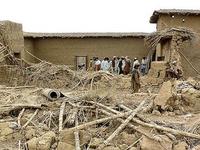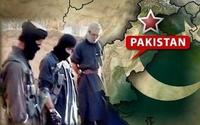-
NSA threatened AT&T over buying phone gear from China
The U.S. National Security Agency, worried about Chineses spying, earlier this year warned AT&T that if the company were to go ahead with its decision to purchase equipment for a next-generation phone system from China’s Huawei Technologies, then AT&T would lose all of its U.S. government business; AT&T has decided to buy the gear from Ericsson AB of Sweden and France’s Alcatel-Lucent SA instead
-
-
Interpol: arrest warrants for 3 Pakistani military officers for Mumbai attacks
Interpol has issued warrants for the arrest of three Pakistani military officers — two serving officers in the Pakistan army and a retired Pakistan Army Major — for masterminding the 2008 terror attacks on Mumbai in which 166 were killed; the development follows an admission earlier this week by the former Pakistani military ruler General Musharraf that Pakistan had raised terrorist groups to attack India because of India’s refusal to negotiate over the dispute on the future of Kashmir
-
-
California launches forgery-proof driver's license
California’s Department of Motor Vehicles has begun issuing a redesigned security-enhanced drivers license which is loaded with features to thwart would-be forgers and identity thieves; this is the first major revision to the card since 2001
-
-
Insights into molecular behavior may encourage nuclear proliferation
The conventional separation techniques of the more fissionable uranium 235 from uranium 238, rely on giant centrifuges that are difficult and expensive to build and so form an important technology barrier that prevents countries with nuclear weapons aspirations from making their own highly enriched uranium; there is a growing fear, however, that laser enrichment will make this much process easier; now there is a new technique for controlling the trajectories of spinning molecules could make isotope separation even easier
-
-
British citizen killed in Pakistan linked to Times Square bomber

The Obama administration, having concluded that Pakistan has been unwilling aggressively to pursue al Qaeda and Afghan Taliban militants in the Pakistani tribal lands, has dramatically stepped up attacks by UAVs and special forces on Taliban and al Qaeda targets in Pakistan; the attacks have been escalated not only quantitatively, but qualitatively as well: the presence of European citizens — and, presumably, U.S. citizens — in the militants’ training camps no longer serves as a deterrence; the killing on Monday of nine Germans one Briton in a CIA drone attack is the latest example
-
-
Growing worries about terror groups' tech-savvy Western recruits
The latest trend in al Qaeda’s operational approach: recruiting tech-savvy Westerners; James Clapper, U.S. director of national intelligence: “The increasing role of Westerners, including Americans in al Qaeda-associated groups, increases their knowledge of Western culture and security practices and of course enhances their access—- That obviously raises the potential specter of attacks”
-
-
Regulators: N.J. nuclear plant employee was an Islamic jihadist

A 26-year old American, Sharif Mobley, now under arrest in Yemen for terrorist activities, became an Islamic militant while working for six years at several nuclear plants in New Jersey, Pennsylvania, and Maryland; the man — who told fellow workers “We are brothers in the union, but if a holy war comes, look out” — had unescorted access to the interior of the plants; to have unescorted access to secure areas of a nuclear power plant, a person must undergo a background investigation, including a criminal record check and a psychological assessment — but the rules did not account for temporary workers who migrate from plant to plant, as Mobley did
-
-
Iran: Stuxnet part of Western sabotage campaign
Iran claims that the Stuxnet virus which infected more than 30,000 computers used in industrial control systems in the country — many of them in Iran’s nuclear weapons facilities, especially to yet-to-become operational Bushehr nuclear power plant — is part of a covert Western plot to derail its nuclear program; this is the most direct admission by Iran that the West — read: the United States and Israel — have been engaged in a systematic covert sabotage campaign to derail Iran’s weapons program
-
-
Voice biometrics help detect Euro terror plot
Western intelligence services say that the discovery of the recent Euro terror plot owes at least some of its success to voice recognition technology that allows law enforcement electronically to match a voice to its owner; the technique can be an effective antiterror tool, and law enforcement agencies are already considering how a voice database could help thwart future plots
-
-
Missing links unveiled?
Two years ago a high-level Syrian general was killed; are we getting closer to the truth about the operation that led to his assassination? Also: Musharaf speaks about the past — but what about the future?
-
-
U.S. intelligence: Europe terror plot did not target Americans

U.S. intelligence says the latest threat did not appear to involve the United States; possible targets of the plot included several tourist attractions across Paris and Berlin. ABC News reported Monday that at least five European airports could be targeted as well; the list of possible targets includes the Eiffel Tower in Paris and the luxury Hotel Adlon near Berlin’s Brandenburg Gate, the Notre Dame Cathedral in Paris, as well as Berlin’s Central Station and its landmark Alexanderplatz TV tower; one official said security has also been tightened around the British royal family
-
-
Evolving terrorist threat: home-grown radicalized Western Muslims to the fore
The relentless attacks by U.S. drones — and, away from the headlines, U.S. special forces — on militants’ hideouts in Pakistan — and also, to an extent, the half-hearted, pick-and-choose-among-militants campaign by the Pakistani military — have forced al Qaeda to rely more and more on home-grown, radicalized Islamists in Western countries for terrorist actions instead of militants from Muslim countries
-
-
Number of extremist, hard-to-police Web sites skyrockets
The number of extremist Web sites has skyrocketed, expanding from 12 in 1998 to 4,500 in 2006; Western authorities say that taking action to remove them remains difficult; different countries have adopted different approaches to the problem
-
-
Iran: Stuxnet infected industrial computers cleaned
Iran claims that Stuxnet, the sophisticated virus which has infected more than 30,000 computers used in industrial control systems in Iran, has been removed; Iranian officials also denied that the Bushehr nuclear reactor was among the addresses penetrated by the worm
-
-
Pakistan: Several dozens of Europeans in terror training in Pakistan

Pakistan, Western intelligence agencies say several dozens Muslim militants with European citizenship are believed to be hiding out in the lawless tribal area of northwestern Pakistan, training for missions that could include terror attacks in European capitals; among the militants are at least twenty British and twenty German citizens; the groups voice-printing software enables British intelligence to identify and track specific individuals believed connected to terror plots; mobile phone communications have been tracked from the border area to points in Britain, particularly England’s Midlands, where there is a heavy Pakistani immigrant population
-
More headlines
The long view
Factories First: Winning the Drone War Before It Starts
Wars are won by factories before they are won on the battlefield,Martin C. Feldmann writes, noting that the United States lacks the manufacturing depth for the coming drone age. Rectifying this situation “will take far more than procurement tweaks,” Feldmann writes. “It demands a national-level, wartime-scale industrial mobilization.”
No Nation Is an Island: The Dangers of Modern U.S. Isolationism
The resurgence of isolationist sentiment in American politics is understandable but misguided. While the desire to refocus on domestic renewal is justified, retreating from the world will not bring the security, prosperity, or sovereignty that its proponents promise. On the contrary, it invites instability, diminishes U.S. influence, and erodes the democratic order the U.S. helped forge.
Fragmented by Design: USAID’s Dismantling and the Future of American Foreign Aid
The Trump administration launched an aggressive restructuring of U.S. foreign aid, effectively dismantling the United States Agency for International Development (USAID). The humanitarian and geopolitical fallout of the demise of USAID includes shuttered clinics, destroyed food aid, and China’s growing influence in the global south. This new era of American soft power will determine how, and whether, the U.S. continues to lead in global development.
Water Wars: A Historic Agreement Between Mexico and US Is Ramping Up Border Tension
As climate change drives rising temperatures and changes in rainfall, Mexico and the US are in the middle of a conflict over water, putting an additional strain on their relationship. Partly due to constant droughts, Mexico has struggled to maintain its water deliveries for much of the last 25 years, deliveries to which it is obligated by a 1944 water-sharing agreement between the two countries.
How Disastrous Was the Trump-Putin Meeting?
In Alaska, Trump got played by Putin. Therefore, Steven Pifer writes, the European leaders and Zelensky have to “diplomatically offer suggestions to walk Trump back from a position that he does not appear to understand would be bad for Ukraine, bad for Europe, and bad for American interests. And they have to do so without setting off an explosion that could disrupt U.S.-Ukrainian and U.S.-European relations—all to the delight of Putin and the Kremlin.”
How Male Grievance Fuels Radicalization and Extremist Violence
Social extremism is evolving in reach and form. While traditional racial supremacy ideologies remain, contemporary movements are now often fueled by something more personal and emotionally resonant: male grievance.
